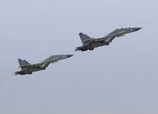
At the same time, however, the approaches preferred by China have also stagnated. China has always called for the related parties to seek denuclearization through diplomatic channels. But it has been difficult to get the parties concerned to the negotiating table, as mutual trust is fragile. Additionally, the US and the ROK usually set preconditions for talks with the DPRK, which has been the main obstacle in the way of dialogue.
As a result, the Six-Party Talks have been stalled for years. After the UNSC adopted the resolution condemning Pyongyang's satellite launch in December, the DPRK declared that the Six-Party Talks and the Sept 19 Joint Statement no longer exist.
The US, China, the ROK, Japan and the DPRK should be aware that stability in the region is at risk. Any provocation could further deteriorate the situation.
Yet despite failure and frustration, it is still too early to give up on the goal of the denuclearization of the Korean Peninsula. Actually, it is time to work out a comprehensive solution that takes into account the interests of all the parties concerned.
A solution to the DPRK's nuclear issue requires: open communication, avoiding an arms race, and regional cooperation.
First, the related parties should not waste time and energy haggling over the pattern or make-up of talks. Instead, willing parties should embrace open communication straight away. Regardless of whether they are bilateral or multilateral, an open discourse would be helpful in reducing the tension that has built up.
Second, an arms race should be avoided. The competition between the DPRK's nuclear and missile capabilities and the United States' nuclear umbrella will lead to further military buildup in the region. Moreover, the proposed US-Japan-South Korea anti-missile system will only make the situation more complicated. Ultimately, a zero-sum game is against every country's interests.
Finally, comprehensive solutions should be presented in an extensive framework, aiming at regional development and cooperation. Signs indicate that the new leadership in the DPRK has already begun to pay more attention to the country's economic development and reform. This is an opportunity for other parties to engage with the DPRK and involve it in the construction of a regional cooperation framework. A proposal about energy and economic cooperation in the Peninsula may be an appropriate starting point. Afterward, the mechanisms for security and common prosperity in Northeast Asia will catch up.
The author is deputy director of the Department of International and Strategic Studies at the China Institute of International Studies. www.chinausfocus.com

















 Provocative propaganda on environmental protection leaded by Chen Guangbiao
Provocative propaganda on environmental protection leaded by Chen Guangbiao


![]()
